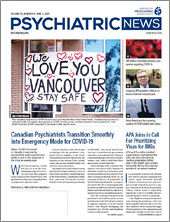APA’s Ethics Committee has received a number of questions related to ethical practice during the COVID-19 pandemic. Below are two of the questions and the committee’s response. More questions and answers will appear in the next issue of Psychiatric News.
Q. When we use unfamiliar technologies (for example, telehealth technologies) to provide treatment during COVID-19, what considerations should psychiatrists be aware of to ensure disruptions of care are minimized?
A. The availability of technology is incredibly helpful during this public health crisis as it allows psychiatrists and patients to continue treatment while apart because of physical distancing. While using these technologies, psychiatrists have an ongoing ethical responsibility to maintain patient confidentiality and proper therapeutic boundaries. Psychiatrists should inform patients that there may be limits to confidentiality given the risks inherent in the use of the internet that would not necessarily exist for an in-person session and establish the expectations of the changed treatment relationship by informing patients that telehealth sessions are treatment sessions in the course of care and will be billed as such. If a psychiatrist encounters a patient who expresses a preference to be seen in person even when physical distancing recommendations are in place, the psychiatrist may try to work with the patient to make the patient feel more comfortable with the use of technology, including by informing the patient that it is in his/her/their best interest to avoid environments (such as the psychiatrist’s office building) that could increase one’s chances of contracting or disseminating the infectious disease.
All psychiatrists have a duty to think about the greater good given the present circumstances of the COVID-19 global pandemic. It is worth noting that reliance on technology to provide remote treatment at this time is not a matter of convenience or personal preference on the part of the psychiatrist, but instead is motivated by the responsibility to care for individual patients while also contributing to lifesaving physical distancing measures to flatten the curve and minimize contagion. In these circumstances, the individual preference of the patient cannot alone justify departure from the public health responsibilities of the psychiatrist. However, where an urgent or emergent clinical situation exists, psychiatrists should, similarly, be aware that exigency may require in-person assessment and/or treatment and that principles of competent care and ethics both require that the psychiatrist provide or arrange for this care notwithstanding public health concerns, with adequate personal protections in place to decrease the risk of contracting or disseminating infection during the encounter.
Q. How much personal risk are psychiatrists expected to take while attending to the treatment of patients during the COVID-19 crisis, and what extra duties might psychiatrists have in this environment?
A. Historically during times of epidemics, there has been an expectation that physicians, because they are specially trained and equipped, have obligations to serve the public good, even beyond the expectations of other professions. Such obligations, however, fall along a spectrum depending upon one’s skill, position, and the protections afforded the individual physician. While individuals may opt to or need to limit their actions to minimize their own personal risk and/or to protect their family, an organization (such as a health care facility or state health department) has an obligation to provide physicians to step in and take those risks to ensure that adequate care will be provided and to provide the personal protective equipment to the staff so that care can be safely given. Ethical dilemmas arise when there are multiple ethical responsibilities that stand in tension with each other.
During this pandemic, treating psychiatrists have competing obligations to their patients, to themselves, to their families, and to the public good. Similarly, physicians have responsibility for public health efforts, but at the same time must acknowledge that the health systems in which they are asked to serve are held accountable, while making decisions under conditions of uncertainty. This is why contingency plans may be required when equipment is in short supply. Organizations and governments that call upon physicians to serve in times of public health emergencies for the care of patients and promotion of public health have a reciprocal responsibility to provide protection (including personal protective equipment) for physicians to allow them to provide care as safely as possible. In other words, this accountability on the part of governments and health systems for adequate safety measures is a necessary condition.
That being said, as during the current COVID-19 pandemic, actual conditions and protections may deviate from the ideal during times of public health emergencies. These are very difficult issues being faced at a very difficult time for humanity. When determining the appropriate resolution of professional ethical dilemmas, it is important to maintain humility—while psychiatrists can and should think through how to balance competing responsibilities in any individual case, they also must recognize that often the answer is not clear, and it will always depend on the circumstances of each individual case. Psychiatrists should be aware of both the risks of service and recusal from service in light of medicine’s responsibilities to the public good as a healing profession. There are no simple answers and psychiatrists are encouraged to seek consultation with colleagues and ethics resources to navigate these challenging times. ■
APA members who have questions about ethics issues related to the COVID-19 pandemic are invited to send them to the Ethics Committee
here. The committee will respond directly to those who submit questions.
More opinions are posted
here.

